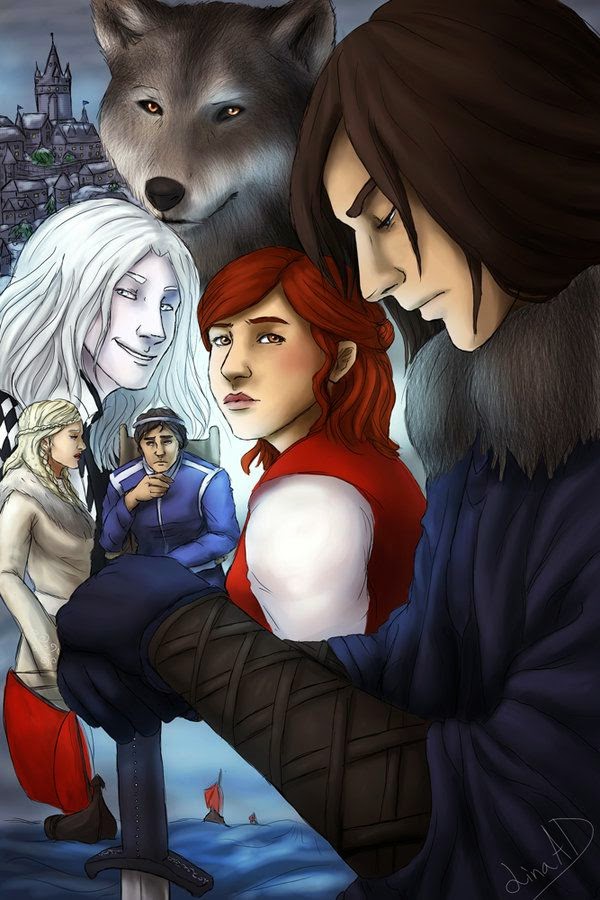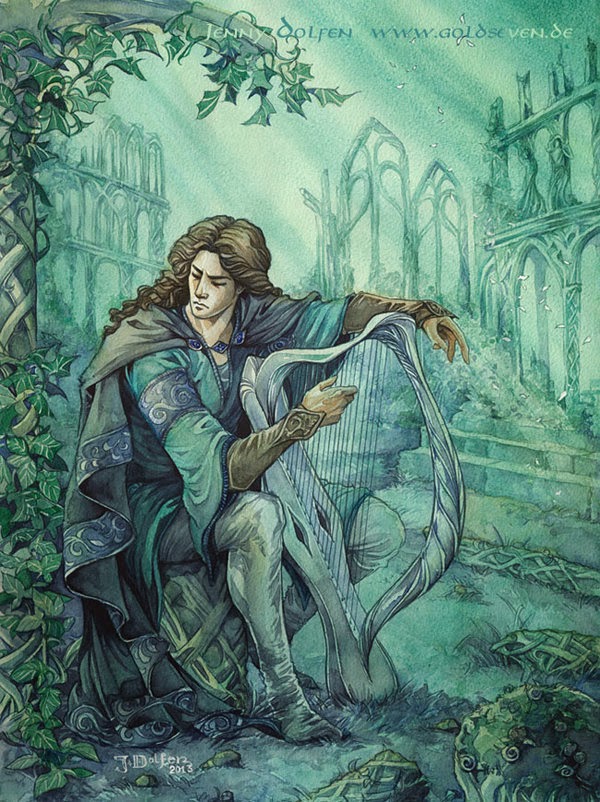Order a copy of Jackaroo here.
This image was originally found here.
Long long ago in a galaxy far away (actually, in Jacksonville Beach, Florida, circa 1991 or 1992), my best friend's mother read us to sleep with a book called On the Wings of a Falcon by Cynthia Voigt. Although it shredded my baby feels into confetti, I developed an unreasonable fondness for that book. Later, as an adult, I remembered it with nostalgia and tracked down a hard copy for my library.
It was only in reading the back of the book that I realized it was number three in a series. My heart went pitter pat with delight. I had just gone through a Patricia McKillip binge and I needed a new author to read. As much as I love McKillip's ornate, poetic prose and her worlds that brim with magic, I felt the need for something a bit more grounded. If On the Wings of a Falcon was any indication, Cynthia Voigt would be just what the doctor ordered.
Of course, because this is me we're talking about, I got distracted by something shiny and forgot about it for a while. Weeks later, it hit me in an avalanche of renewed joy when I was lying on my couch, suffering through the vagaries of cable TV. I turned off the TV and I downloaded book one, Jackaroo, onto my ipad.
The rest, my friends, is history. As in, these books have the feel of actual history, a time and a place that could actually happen. Instead of elves, fairies, orcs, and goblins (which definitely have their place), Cynthia Voigt's Kingdom is filled with hardworking people in a medieval society who live under the thumbs of the Lords, their lives filled with toil and difficulty, but softened by family and friendship. In this way, and so many others, the characters come across as real, relatable people whose problems don't feel so far removed from our own. And the best example of this principle is in the main character, Gwyn,
One of the original covers.
This image was found here.
Gwyn is the Innkeeper's daughter, and as such occupies a place of relative privilege when compared to the other common people. Times are hard because of a war going on in the south, but the inn's custom always thrives. While others may go without, Gwyn wears good sturdy clothes, always has enough to eat, and her father has the coin to give her a good dowry.
But this does not mean, as some of her envious neighbors might think, that her life is a bed of roses. For one thing, Gwyn's life is filled with toil, and she is a good, strong, steady worker who is still not valued as much as her bratty younger brother, Tad, the Innkeeper's sole surviving son. Furthermore, she's at a crossroads in her life where she must make a difficult decision. The custom among the people is that when a girl comes of age, she must either announce that she is interested in marriage or declare she'll never marry. If she announces the intention of marriage and no one speaks for her in a set amount of time, she still ends up forever single, owing her labor to whichever male relative inherits her father's holdings. The same results follow from announcing her intention that she'll never marry. If a man speaks for her and she says yes, then it's to her husband's house that she goes, and adds her labors to his.
Gwyn, unfortunately, has her heart set on a man who hates her father. Out of spite, he'll never ask for her. She doesn't want anyone else, so she's decided that she'll never marry. However, the marvelous thing about this book is even though the story does touch upon the fears of a woman who knows that if she doesn't marry, she'll be looked upon a certain way by society, and she'll have no one to support her as she ages, this is not the sum total of the story. It is not about whether or not Gwyn will have a man in her life, it's about the use she decides to put her life to instead.
Another cover.
This image was found here.
In this story, Gwyn sees the injustice that other people ignore and aches to do something about it. She is inspired by the legend of the Jackaroo, a daring highwayman who robs from the tax collector and gives to the poor, who saves innocent men from the noose, and punishes the greedy and corrupt. And when certain events make her realize how poorly she belongs in the neat little world that she's inhabited her whole life, she begins to look for ways to follow the Jackaroo's example and fight for those in need.
This is not your typical fantasy novel, brimming with magic and curses and fantastic creatures, but Cynthia Voigt's world-building has such depth and detail that the Kingdom still captures the imagination. There is something rich and compelling even in the quiet scenes of life at the inn, showing Gwyn at her tasks or interacting with her family and the Innkeeper's servant, Burl, that one doesn't pine after the clash of swords or the twinkle of fairy dust. It is a quiet story with moments of action and peril instead of an emphasis on breakneck pacing, a thoughtful story with excellent character development, and ultimately, it's a very satisfying story.
There is something hypnotic about Cynthia Voigt's writing. She isn't the dreamy, poetic writer that McKillip is, for instance, but there is a strong, steady craftsmanship in her words, and they are embroidered with just the right amount of beautiful imagery. They lead you inexorably from one plot point to the next, leaving you unable to look away, until the book is done. It is why I, who usually linger and mull over a book, strolling through the pages and sopping up every last word, was done with this book in two weeks, then promptly reread the ending over again to enjoy it a second time. I was done with the second book even more quickly, and I have plans to go back and reread the last half. I fell under the spell of the world, characters, and the strong writing, and I couldn't stop turning pages once I started. Further, although they can be read separately and they stand alone as distinct stories (with subtle connective tissue between the books, nonetheless), Voigt's Kingdom books are addictive, like potato chips: you can't read just one.
All in all, I think this book excels at so many things, but it's the stunningly detailed and relatable main characters that really sell it for me. I loved Gwyn, how she was clever and knew her own mind, but never went into that perilous, over-the-top shrew extreme that sometimes gets mistaken for strength. She was competent and capable and brave and compassionate, but she was also headstrong and apt to make impulsive decisions. She wasn't always kind to her brother or the quiet and somewhat mysterious Burl, but never for even the smallest of moments was she unlikable. So I'd highly recommend that you pick up your own copy and spend some time with Gwyn in Voigt's Kingdom today!
.jpg)























